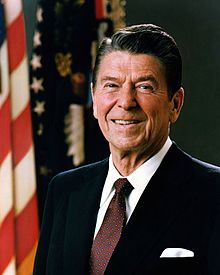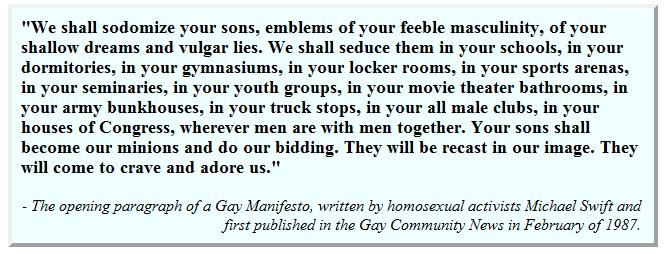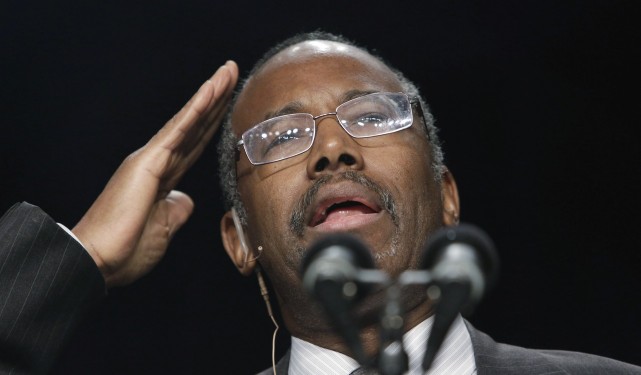
Ronald Wilson Reagan (pron.: /ˈrɒnəld ˈwɪlsən ˈreɪɡən/; February 6, 1911 – June 5, 2004) was the 40th President of the United States (1981–89). Prior to that, he was the 33rd Governor of California (1967–75), and a radio, film and television actor.
Born in Tampico, Illinois, and raised in Dixon, Reagan was educated at Eureka College, earning a Bachelor of Arts degree in economics and sociology. After graduating, Reagan moved first to Iowa to work as a radio broadcaster and then, in 1937, to Los Angeles where he began a career as an actor, first in films and later television. Some of his most notable films include Knute Rockne, All American (1940), Kings Row (1942), and Bedtime for Bonzo (1951). Reagan served as President of the Screen Actors Guild and later as a spokesman for General Electric (GE); his start in politics occurred during his work for GE. Originally a member of the Democratic Party, his positions began shifting rightward in the 1950s, and he switched to the Republican Party in 1962. After delivering a rousing speech in support of Barry Goldwater‘s presidential candidacy in 1964, he was persuaded to seek the California governorship, winning two years later and again in 1970. He was defeated in his run for the Republican presidential nomination in 1968 and in 1976, but won both the nomination and general election in 1980, defeating incumbent Jimmy Carter.
As president, Reagan implemented sweeping new political and economic initiatives. His supply-side economic policies, dubbed “Reaganomics“, advocated reducing tax rates to spur economic growth, controlling the money supply to reduce inflation, deregulation of the economy, and reducing government spending. In his first term he survived an assassination attempt, took a hard line against labor unions, and ordered an invasion of Grenada. He was re-elected in a landslide in 1984, proclaiming that it was “Morning in America“. His second term was primarily marked by foreign matters, such as the ending of the Cold War, the 1986 bombing of Libya, and the revelation of the Iran-Contra affair. Publicly describing the Soviet Union as an “evil empire“,[1] he supported anti-communist movements worldwide and spent his first term forgoing the strategy of détente by ordering a massive military buildup in an arms race with the USSR. Reagan negotiated with Soviet General Secretary Mikhail Gorbachev, culminating in the INF Treaty and the decrease of both countries’ nuclear arsenals.
Reagan left office in 1989. In 1994, the former president disclosed that he had been diagnosed with Alzheimer’s disease earlier in the year; he died ten years later at the age of 93. A conservative icon, he ranks highly in public opinion polls of U.S. Presidents and is credited for generating an ideological renaissance on the American political right.*
Click the large arrow in the center to enjoy once again memorable words of the most beloved President in modern times.
Mr. Gorbachev, tear down this wall!
Although it has been called “The four most famous words of Ronald Reagan’s Presidency”, the speech received “relatively little coverage from the media”, Time magazine reported 20 years later.[13] Communists were critical of the speech,[1] and the Soviet press agency Tass accused Reagan as giving an “openly provocative, war-mongering speech.”[2]
Twenty-nine months later, on November 9, 1989, after increasing public unrest, East Germany finally opened the Berlin Wall. By the end of the year, official operations to dismantle the wall began. With the collapse of the Communist governments of Eastern Europe and, eventually, the Soviet Union itself, the tearing down of the wall epitomized the collapse for history. In September 1990, Reagan, no longer President, returned to Berlin, where he personally took a few symbolic hammer swings at a remnant of the Berlin Wall.[14]
Former West German Chancellor Helmut Kohl said he would never forget standing near Reagan when he challenged Gorbachev to tear down the Berlin Wall. “He was a stroke of luck for the world, especially for Europe.”[15] Although there is considerable disagreement over how much influence Reagan’s words had on the destruction of the wall, the speech is remembered as an important moment in Cold War history.[7]
Peter Robinson, the White House wordsmith who drafted the address, said its most famous line was inspired by a conversation with Ingeborg Elz of West Berlin who had remarked in a conversation with him, “If this man Gorbachev is serious with his talk of Glasnost and perestroika he can prove it by getting rid of this wall.”[16] **
*Read More: http://en.wikipedia.org/wiki/Ronald_Reagan
**Read More: http://en.wikipedia.org/wiki/Tear_down_this_wall

